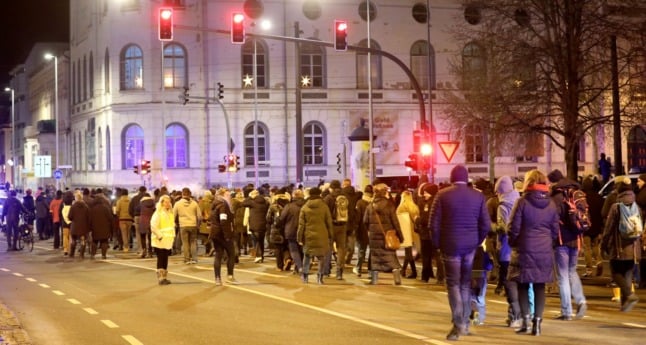A call is out on Telegram for people opposing Covid restrictions to share private addresses of German “local MPs, politicians and other personalities” who they believe are “seeking to destroy” them through pandemic curbs.
Those on the list should no longer be allowed to “live a carefree life,” wrote the group called “Coronavirus-Information” in the message that was put online late November.
Since then it has been viewed by 25,000 people.
On Friday evening, a group of corona-sceptics armed with flaming torches massed outside the house of Petra Köpping, the health minister of Saxony state.
The scenes in the stronghold of Germany’s far-right, accompanied by thumping drum beats, were reminiscent of Nazi-era marches, drawing condemnation from mainstream politicians.
Olaf Scholz, who is due to take office on Wednesday as Germany’s new chancellor, urged society “not to be infected” by such “aggressive” behaviour.
“When such flaming torch processions take place in front of the house of a health minister, that is meant as a threat – that is not just an expression of opinion, and we as democrats strongly reject that,” he said.
READ ALSO: Germany’s new government condemns anti-vax movement
Not only in Germany, but also in the Netherlands and Austria, security services have warned of growing radicalisation among coronavirus-sceptics.
And the Telegram list is just one in a multitude of such examples flourishing on social networks in Germany, attracting opponents of coronavirus curbs from mask-wearing to vaccinations.
‘Dilemma’
The incoming German government’s recent call for compulsory vaccinations has fired up another wave of rage.
Thomas Strobl, who heads the conference of regional interior ministers, warned that mandatory jabs will only “further harden the attitudes of opponents”.
Strobl also accused Internet regulators of falling short in clamping down on such threatening calls online.
But Simone Rafael of the anti-racism Amadeu Antonio foundation said that policing the online sphere was easier said than done.
“German politicians are confronted with a dilemma when it comes to networks like Telegram,” said the expert on online radicalisation.
The only solution would be to completely shut it down. But in democratic Germany, no one wants that.”
As a result, conspiracy theories and violence are spreading. Some users feel so untouchable that they use their real names to threaten people online.
‘Dead serious’
While a wave of dissent against corona curbs had been there since the beginning of the pandemic, the hardening of the discourse is palpable today.
“For the followers of such narratives, this is not a joke but something that is dead serious,” said Miro Dittrich, specialist in the far-right for the research centre CeMAS.
“They are now reaching a point where they can no longer find solutions to their fictional problems through normal means,” he said. As a result, some may turn even to violence.
“We see more and more users on Telegram spreading private addresses in order to attack these people,” he said.
Those targeted have voiced fears of growing threats.
“Doctors involved in the fight against the pandemic are reporting increasing hostility and threats,” said Susanne Johna, who heads the Marburger Bund, a federation of the sector, in an interview with the Funke newspaper group.
After all, some have shown they are prepared to take a step beyond threats.
A young cashier working at a petrol station who asked a client to put on his mask, as required by the law, was shot dead by the man in September, becoming the first fatal casualty of the increasingly violent corona-sceptic movement.
By Max BIEDERBECK



 Please whitelist us to continue reading.
Please whitelist us to continue reading.
You should consider that the people that remains unvaccinated cannot do/move much these days. However, they are still pointed as being responsible of the high number of infections, which is difficult to believe for a person de-facto in lock-down. So the resent messages of MPs are received as an aggression, more personal than logical. I think German MPs should consider more gentle communications to the people, they should avoid sowing hatred.